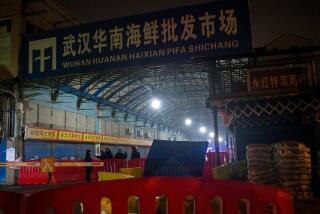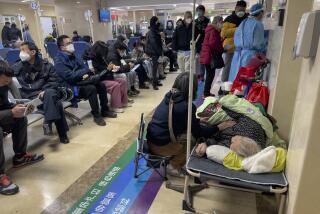SARS Panic Mounts in Beijing as Migrant Workers Flee City
- Share via
BEIJING — In front-page reports in Wednesday’s newspapers, officials insisted that there was no truth to the rumor that the capital would be sealed to prevent the spread of the SARS virus.
Those reassurances failed to prevent a wave of panic buying of food and basic goods, nor did they ease the worries of out-of-town students and migrant laborers who scrambled to get out of the city.
The growing alarm among Beijing residents follows the government’s abrupt lurch from a dearth of information on severe acute respiratory syndrome, or SARS, to a glut. That change in policy shows a government struggling to respond to its fearful people in ways China has not thought necessary.
“Whether because of floods, earthquakes or man-made disasters, panic is a normal reaction among citizens,” said Professor Du Gangjian of the National School of Administration. “For the next month or two the government has got to keep in constant contact with the citizenry, providing up-to-date, accurate information, while monitoring public opinion and prices.”
The People’s Hospital of Beijing University was shut for two weeks and emptied of patients. Beijing has designated six hospitals to handle SARS cases and this one was not among them. “The hospital will be closed for two weeks. All the clinics are shut down and the doctors have all left,” said a staff member by telephone.
Beijing announced seven more deaths, and 105 new SARS cases, bringing the city’s statistics to 35 fatalities and 693 infected, and 782 suspected cases. Many of newly confirmed SARS cases come from those who were previously suspected of having the virus.
Nationwide, the death toll stands at 106, with 2,305 infected. Worldwide, SARS has claimed about 250 lives and infected an estimated 4,288 people.
In Geneva, the World Health Organization added Beijing, northern China’s Shanxi province and Toronto to its travel advisory list, cautioning against any non-essential travel. The locations join Hong Kong and neighboring Guangdong province, which are already on the list.
The new advisories will be in effect for at least three weeks -- roughly twice the virus’ incubation period. With 157 cases and seven fatalities, Shanxi province is third in official SARS statistics, after Beijing and Guangdong.
In Hong Kong, where there are indications the incidence rate is leveling off, the government unveiled a $1.51-billion emergency relief package.
Presented by Hong Kong’s Chief Executive Tung Chee-hwa at a news conference, the proposals included a mix of tax relief, waivers of government license fees and loan guarantees for businesses in the hardest hit sectors of tourism, catering, entertainment and retail trading. Those who are put out of work would be offered training and temporary jobs.
Hong Kong Financial Secretary Anthony Leung called the program part of “a delicate balancing act” to ease the impact on the local economy without endangering longer-term fiscal stability for Hong Kong -- a region that, even before the SARS crisis hit, had been struggling to control budget deficits.
The economic plan came as health authorities in the territory announced six new deaths and an additional 24 confirmed SARS cases. The figures -- roughly in line with those of the last several days -- suggested that the number of new cases may be stabilizing.
The new fatalities raised the SARS death toll for Hong Kong to 105, beyond the psychologically important level of 100. One of those who died was a 34-year-old mother who had her child delivered by caesarean section shortly after contracting the disease.
The Hong Kong government also pledged $166 million for medical research and other longer-term measures to control the disease. The step followed an announcement by Tung only 24 hours earlier that he would seek new funding to train hospital staff.
Collectively, the emergency package constituted the largest step yet by Hong Kong authorities to help those hit by plummeting business activity in the territory -- a former British colony that is now a special administrative region of China.
The near absence of tourists and a new caution among locals has left many companies with sales less than 10% of their average.
Despite the size of the emergency package, there were fears that it might be too late for some enterprises. Many small and medium-sized businesses are operating at barely a fraction of normal turnover.
“I can see a very large number of companies just walking into bankruptcy because they have no cash flow and no line of credit,” consultant David Dodwell said.
In Beijing on Tuesday night, citizens began calling the mayor’s hotline asking about rumors that martial law was to be imposed, or that the city’s eight central districts were to be sealed off. Dismissing the rumors, officials declared that they were “fully confident of triumphing over this sudden disaster,” official Beijing media reported.
In a warning to would-be rumormongers, the official Beijing Morning Post quoted Jin Dapeng, the head of the Beijing Health Bureau as telling state media April 13 that police had arrested an Internet user posting messages under the name of Stephen Shen.
Police investigations showed that Shen had posted bulletin board messages and sent e-mails claiming that an “unidentified disease” was spreading through Beijing and had already claimed 143 lives, the report said. The report denied Shen’s claims as unfounded rumors, but offered no other details. The report did not explain the delay in reporting or possible connections to the SARS epidemic.
The first cases of SARS were discovered in Guangdong province in November. While new, SARS is no longer an “unidentified disease” to most Chinese. A poll earlier this month by the independent firm Horizon Research showed that more than 80% of Chinese urban residents knew what SARS was and felt they knew enough about basic hygiene to protect themselves from the flu-like virus.
The exodus from Beijing in recent days, scholar Du noted, was composed mostly of members of Beijing’s more than 1 million-strong migrant population, many of whom are from the countryside. In China, SARS remains a predominantly urban epidemic, but the exodus could change that.
At Beijing’s Chaoyangmen market, local shoppers stood in long lines to buy rice, flour, Chinese cabbages and other basics, loading bags of goods onto bicycles and carts.
The New China News Agency reported that city officials capped prices of facemasks, herbal cold remedies and disinfectants. The items have been in short supply for days and consumers have reported price gouging.
Education authorities closed all of Beijing’s public schools for two weeks.
Some 1.7 million primary and secondary students were given homework to do, and tests were postponed until further notice. Many students who feared being stranded in Beijing left by bus or train.
“It’s scary,” said a student at Beijing’s People’s University, where the first SARS case was reported Monday.
“There are six of us sitting in a dorm room, and one guy goes to the cafeteria to get food,” one student said by telephone. “Most of us don’t want to stay on campus, but until we go home, we’re staying in our room.”
*
Special correspondent Kuhn reported from Beijing and Times staff writer Marshall from Hong Kong.
More to Read
Sign up for Essential California
The most important California stories and recommendations in your inbox every morning.
You may occasionally receive promotional content from the Los Angeles Times.













